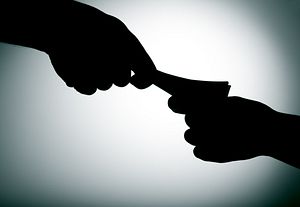Last year Nawaz Sharif made a triumphant return to Pakistan when he was re-elected as Prime Minister for a third (non-consecutive) term. He rode to success on a wave of frustration directed at the previous establishment, which had been dogged by accusations of corruption and abuse of office. In line with his campaign promises, Sharif has said, on the government of Pakistan’s homepage, that “curbing” corruption “ranks very high on the agenda.” But new figures on tax evasion released last month show that Sharif, nine-months into the job, still has a long way to go to make good on his pledge to clean up Pakistan’s politics.
Last year, Transparency International, in their annual survey of corruption across the globe, ranked Pakistan 127 of out 177 countries, a slight improvement on 2012 when the country languished at 139. Transparency International’s Corruption Perceptions Index covers “abuse of power, secret dealings and bribery.” On a scale from 0 (“highly corrupt”) to 100 (“very clean”) Pakistan scored 28 – the same as Russia, Mali and Lebanon. Compared to its South Asian neighbors, Pakistan sits beneath both India (ranked 97/177) and Nepal (ranked 116/177), and scored only one point more than Bangladesh. The only country in the region that Pakistan bested was Afghanistan, which, with a score of 8/100 on transparency, is ranked 175/177 (jointly with Somalia and North Korea) as one of the world’s most corrupt states.
Though imperfect, the Transparency International ranking points to the scale of the problem. The World Bank, in its global governance index, finds that across four categories – government effectiveness, regulatory quality, the rule of law and the control of corruption – Pakistan has been on a downward trend since 2007. These lamentable findings are reflected in surveys of public opinion. In a 2011 Gallup Poll, 81 percent of Pakistanis felt that government corruption was “widespread.”
Figures uncovered last month by Pakistan’s Center for Investigative Reporting (CIR), an independent research group, shed fresh light on the complexities of corruption. The data was drawn from Pakistan’s Election Commission, an independent body that compiles the financial declarations and tax statements of political candidates. According to the CIR, almost 50 per cent of Pakistani lawmakers pay no tax at all, and more than 1 in 10 have never registered with tax authorities. Those that do pay contribute negligible amounts. 2010 figures from the Institute of Legislative Development and Transparency estimate that legislators in Pakistan have a net worth, on average, of $800,000. And yet, according to the CIR’s report, many pay less than $100 in tax, with some contributions as low as $17.
According to Reuters, less than one per cent of Pakistani citizens file tax returns, giving the country a 9 percent tax-to-GDP ratio – one of the lowest in the world. The Express Tribune reports that the cost of corruption to Pakistan’s economy amounts to $133 million per day, $66 million of which is evaded taxes. This endemic tax evasion has encouraged a race to the bottom. As Umar Cheema, the author of the CIR report complains, “if politicians don’t pay taxes themselves, they [lose] the moral authority to impose taxes on others.”
Rampant corruption threatens to undermine the flow of billions of dollars of investment and aid into the country. Combatting corruption is one of the conditions of a $6.7 billion IMF aid programme, and there are reports that major donors, such as the UK, are reconsidering their aid commitments in light of the country’s persistent failure to combat corruption. Pakistan’s energy sector has had funds leeched out of it, resulting in an energy crisis that is stunting the country’s economic growth. Deep distrust of Pakistan’s policy elite and concerns over security have further eroded investor confidence. With an ailing economy, Pakistan’s government can ill afford to allow these streams of finance to dry up.
Most of the key players in Pakistani politics have been hounded by allegations of corruption. 2013, however, marked a comprehensive changing of the guard: Sharif’s fêted return was the country’s first ever civilian transfer of power, and the anointment of more moderate figures to head the country’s military and judiciary are changes that many hope mark the end of a period of apathy on the issue of corruption. Fingers have been pointed at Sharif in the past over claims of financial impropriety, but he is sending all the right signals now. Again on the homepage of the government of Pakistan’s website he writes, “The menace of corruption has thwarted all efforts aimed at institution building and improving public service delivery.” He is aware of the problem. Let us see what, if anything, he does about it.
































